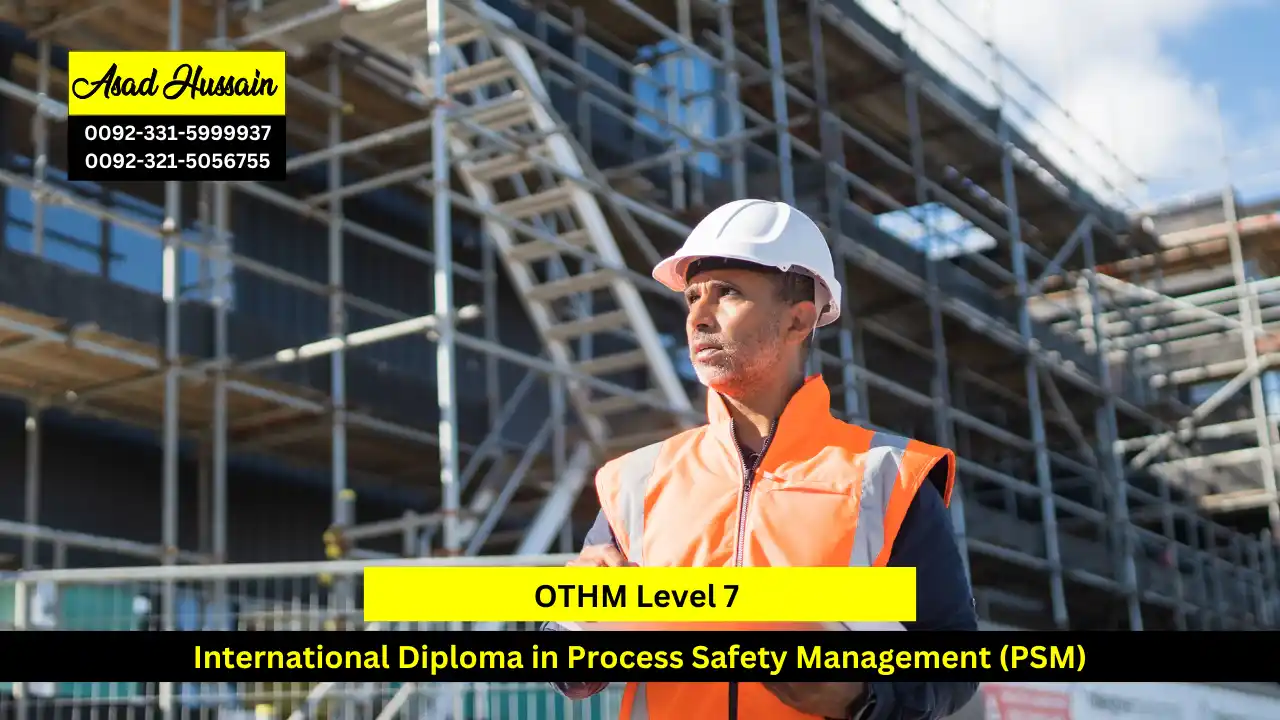In today’s industrial landscape, ensuring the safety of processes and operations is more critical than ever. The OTHM Level 7 International Diploma in Process Safety Management (PSM) is a cutting-edge qualification designed to equip professionals with the advanced skills and knowledge necessary to excel in the field of process safety management. This diploma is not just a credential but a pathway to becoming a leader in safety management, ensuring the well-being of employees and the integrity of industrial operations.
The OTHM Level 7 International Diploma in Process Safety Management (PSM) is meticulously structured to provide a deep understanding of process safety principles. It combines theoretical foundations with practical insights, covering essential topics such as risk assessment, hazard identification, incident investigation, and safety culture. This comprehensive approach ensures that graduates are not only knowledgeable but also capable of applying their skills in real-world scenarios to maintain high safety standards.
The OTHM Level 7 International Diploma in Process Safety Management (PSM) is more than just a qualification; it’s a stepping stone to becoming a leader in the field of safety management. By enrolling in this course, you will gain the knowledge and skills necessary to ensure the highest safety standards in any industrial setting, significantly enhancing your career prospects and contributing to the creation of safer workplaces worldwide. Invest in your future and the safety of others by choosing the OTHM Level 7 International Diploma in Process Safety Management.
Program Highlights
The OTHM Level 7 International Diploma in Process Safety Management qualification consists of 6 mandatory units for a combined total of 120 credits and 600 Guided Learning Hours (GLH) for the completed qualification.
Mandatory Units
| Sr# | Unit Title |
|---|---|
| 1 | Introduction to Process Safety Management (PSM) |
| 2 | Process Safety Management Systems (PSMS), Safety Instrumented Systems (SIS) |
| 3 | Process Safety Engineering |
| 4 | Emergency Planning and Response |
| 5 | Legal and Regulatory Compliance |
| 6 | Environmental Protection in Process Safety |
To ensure that participants are well-prepared for the advanced level of study and the comprehensive nature of the OTHM Level 7 International Diploma in Process Safety Management (PSM), applicants must meet the following entry requirements:
- Educational Background:
- A bachelor’s degree or an equivalent qualification in a relevant field such as engineering, science, or safety management.
- Alternatively, a Level 6 qualification in a related subject, or an equivalent professional qualification.
- Professional Experience:
- A minimum of five years of work experience in a relevant role, particularly in areas related to process safety, industrial safety, or safety management.
- English Language Proficiency:
- If a learner is not from a majority English-speaking country must provide evidence of English language competency.
Upon completion of the OTHM Level 7 International Diploma in Process Safety Management (PSM), learners will be able to:
1. Introduction to Process Safety Management (PSM)
Upon completing this unit, learners will be able to:
- Understand the fundamental principles and concepts of process safety management.
- Identify the key elements and benefits of implementing a robust PSM framework.
- Analyze the historical development and significance of process safety in industrial settings.
- Evaluate various process safety incidents and the lessons learned from these events.
- Develop a foundational knowledge of risk management and hazard control strategies in PSM.
2. Process Safety Management Systems (PSMS)
Upon completing this unit, learners will be able to:
- Design and implement effective process safety management systems in industrial environments.
- Integrate PSMS components, including risk assessment, hazard identification, and control measures.
- Conduct comprehensive audits and reviews of existing process safety management systems.
- Develop strategies for continuous improvement in process safety management practices.
- Apply industry standards and best practices to enhance the effectiveness of PSMS.
3. Safety Instrumented Systems (SIS)
Upon completing this unit, learners will be able to:
- Understand the role and importance of safety instrumented systems in process safety.
- Analyze the components and functionalities of safety instrumented systems.
- Implement and manage SIS in accordance with industry standards and regulations (e.g., IEC 61511).
- Perform safety integrity level (SIL) assessments and determine appropriate SIL levels for various processes.
- Conduct regular testing, maintenance, and validation of SIS to ensure reliability and effectiveness.
4. Process Safety Engineering
Upon completing this unit, learners will be able to:
- Apply engineering principles to identify and mitigate process safety hazards.
- Design and implement safety measures, including relief systems, ventilation, and fire protection.
- Conduct quantitative risk assessments and consequence analysis for process safety.
- Utilize advanced engineering tools and techniques to enhance process safety.
- Collaborate with multidisciplinary teams to develop and implement process safety solutions.
5. Emergency Planning and Response
Upon completing this unit, learners will be able to:
- Develop comprehensive emergency response plans tailored to specific industrial scenarios.
- Identify potential emergency situations and assess their impact on process safety.
- Implement effective communication and coordination strategies during emergencies.
- Conduct emergency drills and simulations to test the efficacy of response plans.
- Evaluate post-incident reports and incorporate lessons learned into future planning and response efforts.
6. Legal and Regulatory Compliance
Upon completing this unit, learners will be able to:
- Understand the legal and regulatory framework governing process safety management.
- Identify and comply with relevant laws, regulations, and standards affecting process safety.
- Conduct regulatory audits and inspections to ensure compliance with legal requirements.
- Develop and implement policies and procedures that align with regulatory standards.
- Stay informed about changes in legislation and adapt compliance strategies accordingly.
7. Environmental Protection in Process Safety
Upon completing this unit, learners will be able to:
- Recognize the environmental impacts associated with industrial processes and safety incidents.
- Implement strategies to minimize environmental risks and enhance process safety.
- Conduct environmental risk assessments and integrate findings into process safety management plans.
- Develop and enforce environmental protection policies and procedures within industrial operations.
- Collaborate with environmental agencies and stakeholders to ensure compliance and promote sustainable practices.
These learning outcomes ensure that graduates of the OTHM Level 7 International Diploma in Process Safety Management (PSM) are equipped with the necessary knowledge and skills to excel in their careers and contribute to the advancement of safety standards in their respective industries.
The OTHM Level 7 International Diploma in Process Safety Management (PSM) is designed for professionals and aspiring leaders in the field of safety management. This advanced qualification is ideal for:
1. Safety Professionals
- Current Safety Officers and Managers: Individuals already working in safety roles who want to deepen their expertise and advance their careers.
- Health, Safety, and Environment (HSE) Managers: Professionals responsible for overseeing safety policies and procedures within their organizations.
2. Engineers and Technical Staff
- Process Engineers: Engineers involved in designing and managing industrial processes, who need to ensure these processes are safe and compliant with safety regulations.
- Chemical Engineers: Engineers working with chemical processes who require advanced knowledge in safety management to prevent incidents and manage risks.
3. Managers and Supervisors
- Plant Managers and Supervisors: Individuals overseeing daily operations in industrial plants who need to understand and implement process safety management systems.
- Operations Managers: Managers responsible for the smooth running of industrial operations, who must ensure safety protocols are integrated into everyday processes.
4. Aspiring Safety Leaders
- Recent Graduates: Individuals with a background in engineering, science, or safety-related fields who are seeking to enter the field of process safety management.
- Mid-Career Professionals: Professionals looking to transition into safety management roles from other technical or managerial positions.
5. Consultants and Advisors
- Safety Consultants: Professionals providing expert advice on safety management to various industries, who wish to enhance their credibility and knowledge base.
- Risk Management Advisors: Specialists focused on identifying and mitigating risks in industrial settings, who need comprehensive training in process safety.
6. International Candidates
- Global Safety Practitioners: Professionals working in multinational companies or in countries with stringent safety regulations, seeking a globally recognized qualification to bolster their credentials.
- Expatriates and Foreign Workers: Individuals working in international industrial environments who need to align their safety practices with global standards.
This course caters to a diverse group of professionals, all of whom share a common goal: to ensure the highest standards of process safety within their organizations. By providing advanced knowledge and practical skills, the OTHM Level 7 International Diploma in Process Safety Management (PSM) prepares participants to take on critical safety roles and lead their organizations towards a safer, more compliant future.







